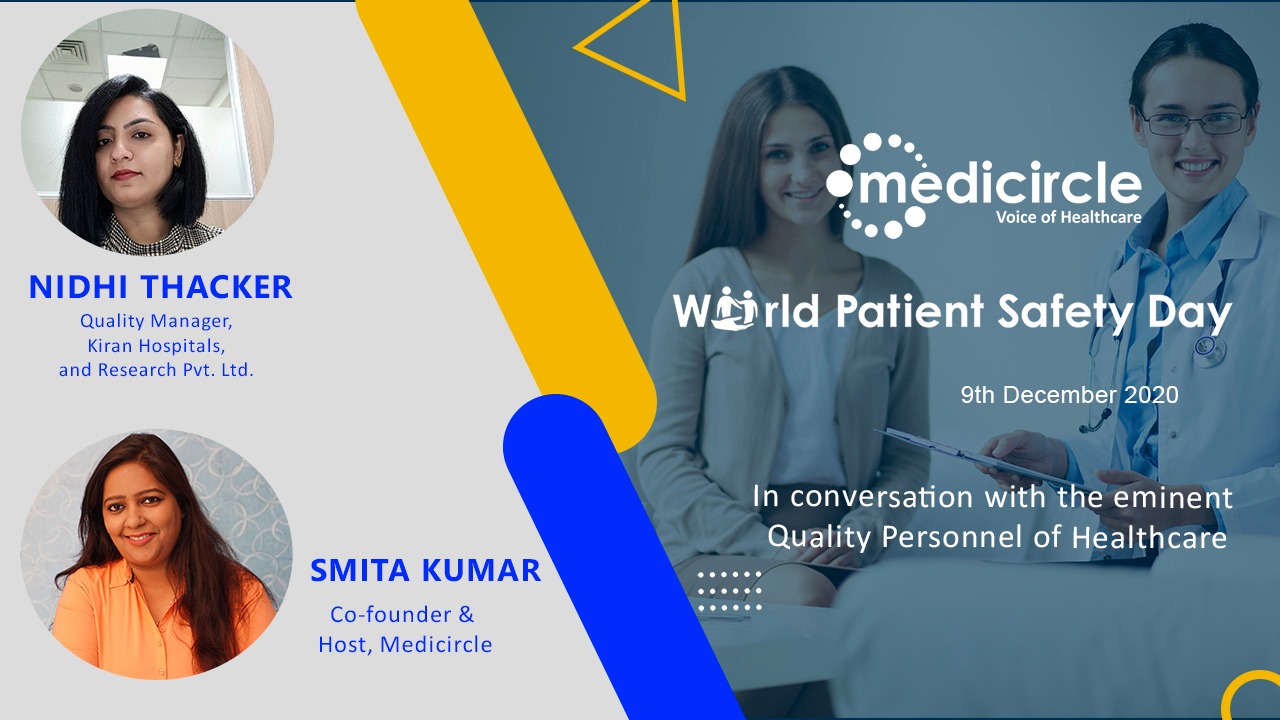Patient safety is the absence of preventable harm to a patient during the process of health care and the reduction of the risk of unnecessary harm associated with health care to an acceptable minimum.
Nidhi Thacker, Quality Manager, Kiran Hospitals and Research Pvt. Ltd is a Healthcare professional with Quality Improvement, Patient Safety, Risk Management and Accreditation experience, Hospital operations, HIS implementation from the last 9 years.
Kiran Hospitals and Research Private Limited are majorly in Community, personal & Social Services business for the past 10 years.
COVID has sensitized everyone
Nidhi sheds light on the subject, “COVID has sensitized everyone to follow the instructions and adhere to the defined standards i.e. importance of PPEs, 5 moments and steps of hand hygiene, etc. Not the whole world but health care workers were aware of it but following 5 moments and all the steps of hand hygiene were still challenging, so according to me, Covid helped in creating a culture of sensitivity towards the defined protocols which help in keeping the patient as well as healthcare workers safe from infection,” she says.
Contribution towards Safe health workers, Safe patients
Nidhi explains, “Being a health care quality professional, it's my responsibility to reiterate the importance of safety precautions to be followed, which I do in training sessions that all need to adhere to the universal and standard precautions. I celebrated Patient Safety Week where all the staff was involved in participating in the quiz, puzzle, slogan making, and poster making competition for a week. These fun activities made a long-lasting impact on the minds of employees to adhere to safety precautions,” she says.
Healthcare highly influenced by technology trends is a boon
Nidhi shares her thoughts, “Digitalization always helps I believe, and it reduces error. Healthcare workers are busy in inpatient care so digital alarms always help in prompt care. All biomedical equipment and all diagnostic equipment if connected with Hospital Information System then it can do wonders, by reducing a lot of manual entries thereby decreasing the chances of errors like wrong labeling, patient identification errors while reporting, and it will give us real-time and more relevant data as well as time to act upon,” she says.
Create a safe culture in the organization
Nidhi explains in brief as to how they ensure proper patient safety from Diagnostic errors, healthcare-acquired infections, medication errors, readmissions, wrong-site surgery, and communication, “Healthcare organizations run 24x7 in 3 shifts, 1 patient is taken by more than 6 persons in a day, as those 6 persons also take care of other patients too; therefore there is always a risk of hospital-acquired infection and medication errors. Therefore, I believe in creating a safe culture which I create by training sessions which are interactive and include examples of the incidents of the organization, it includes as below:
- Transparent and honest communication
- Non-punitive corrective and preventive actions
- No fear of mistakes
- Sensitivity towards mankind
- Empathy towards patients being taken care of.
I always make sure where none of the health care is under pressure or overburdened. They can themselves report their mistakes like miss dose or under dose given so we can treat the patient in a better way and others don't commit the same mistakes. I also believe in capturing Quality Indicators by HIS:
For example, return to ICU within 48 hours if captured from HIS, will give
- The actual number of cases per month making our data correct
- Actual reasons for the same can be identified
- Proper corrective, as well as preventive actions, can be identified so as to reduce such instances in future,” she says.
Edited By- Rabia Mistry Mulla

 “Being a health care quality professional, it's my responsibility to reiterate the importance of safety precautions to be followed,†says Nidhi Thacker, Quality Manager, Kiran Hospitals and Research Pvt. Ltd.
“Being a health care quality professional, it's my responsibility to reiterate the importance of safety precautions to be followed,†says Nidhi Thacker, Quality Manager, Kiran Hospitals and Research Pvt. Ltd.










.jpeg)




.jpeg)

.jpg)













